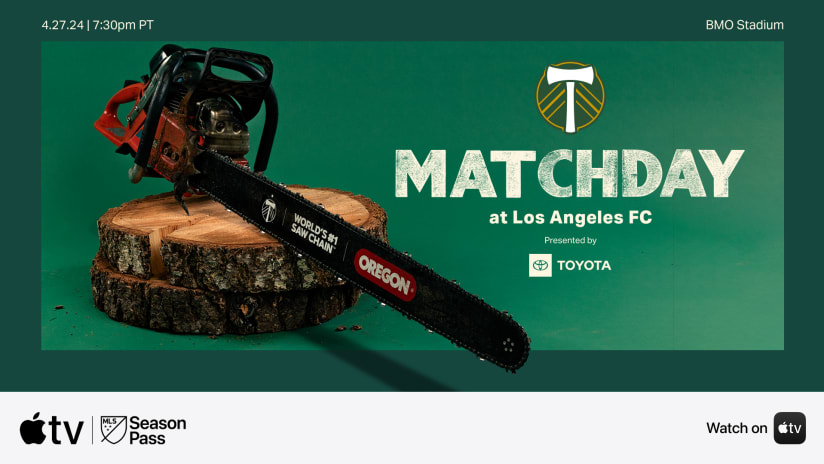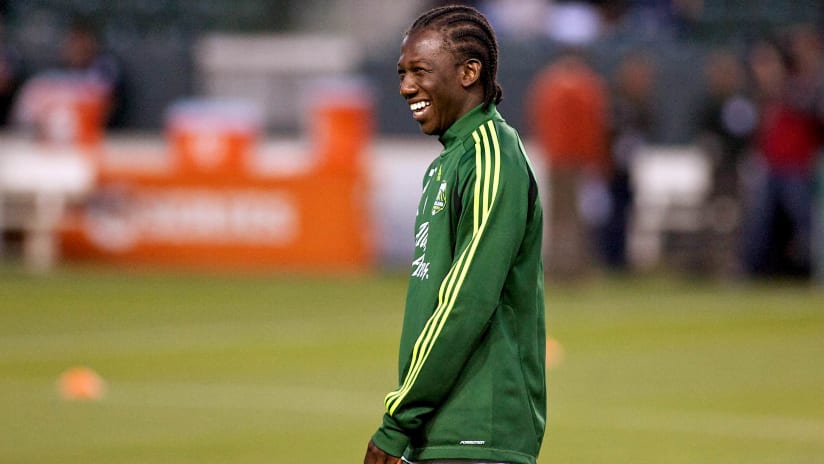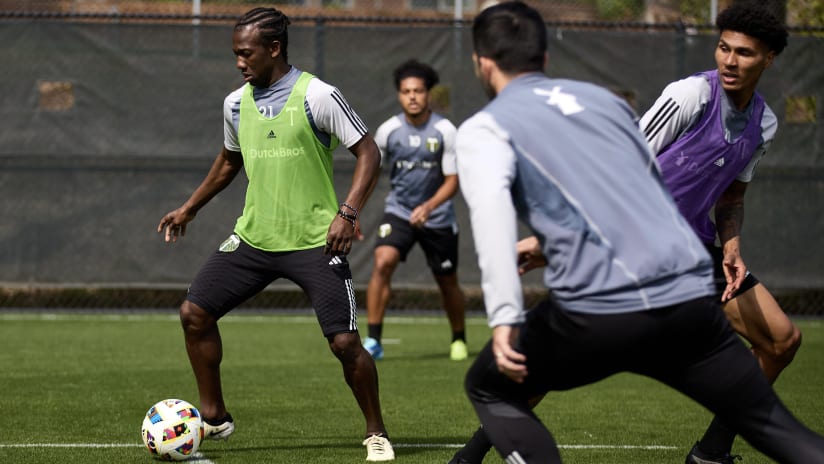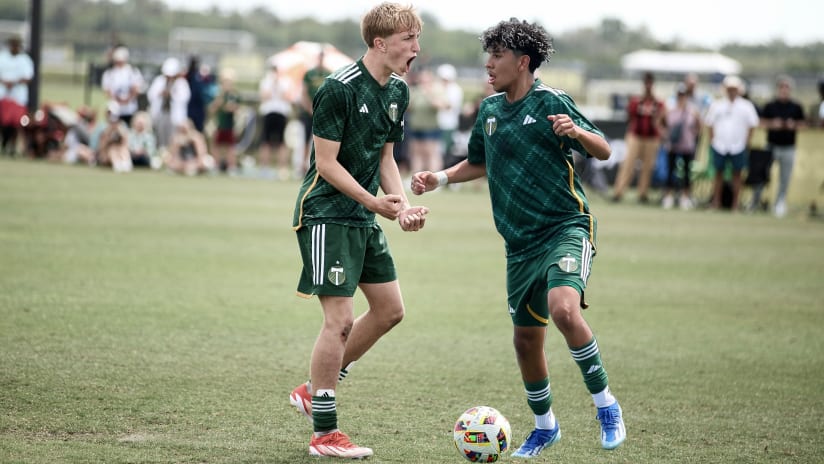In two of his interviews over the last week, Portland Timbers head coach Giovanni Savarese has acknowledged his coming opponents’ struggles. He’s also warned that opponent is maybe more dangerous than their recent results show.
On Tuesday, the Timbers get the next benefit of last summer’s MLS is Back Tournament triumph, beginning Scotiabank Concacaf Champions League play against one of Honduras’s representatives, Club Deportivo Marathón. The tournament is for the best performing teams in North and Central American as well as Caribbean soccer.
Marathón was one of those teams when they qualified for Champions League via their Concacaf League performance last fall. Out of 22 teams, then ended up ranked sixth in the single-elimination tournament. Since, as Savarese says, they’ve been less successful.
“Marathón is a team that has been struggling in their season in Honduras,” Savarese said on Friday, during a video press conference, “but if you watch the matches, they have been always competitive. They have a style of play that they believe in. They are all very much engaged [with] that style of play, and [the matchup is] complicated.”
Marathón currently sits at the bottom of their five-team group in Honduras’s Liga Nacional, having only earned six points from their nine matches. As a point of reference, fellow Honduran Champions League qualifiers Olimpia have earned 19 points in their eight games. Whereas at the end of the previous Honduran tournament Marathón was thriving, sitting top of their group going into the league’s playoffs, a thrashing in the final at the boots of their Champions League counterpart has reversed their fortunes.
No game captures Marathón’s turn more than their March 3 visit to Platense, a team that sits only one place above them in the standings. Having already started the league’s Clausura slowly, earning only four points from the tournament’s first four games, Marathón gave up three goals in their first 31 minutes at Platense, leading to head coach Héctor Vargas's three substitutions by the game’s 36th minute. Come halftime, the score was 5-1, and by the game’s 57th minute, Marathón had used its final two substitutions. The game ended 5-3, but Platense played the last 25 minutes with only 10 men on the field.
Followers of international soccer can recite remember a list of teams who, despite struggling in their league, thrived in their international tournaments, but it might be a valuable reminder to those who are new to competitions like Concacaf Champions League, or fans who might overlook a team’s ability to change course. The reigning Concacaf champions, Tigres UANL of Mexico, finished sixth in Liga MX in December, when they also won Concacaf’s title. More famous examples, like Chelsea FC’s run to the UEFA Champions League title in 2012, also fit here, and if you needed a longer list, it would not be difficult to make one. Playing well is always important, but as the fine print on your investments reminds you, past performance is no guarantee of future results.
Despite that reminder, the Timbers certainly seem like favorites ahead of their trip to Honduras. You can glean that from Marathón’s form, the resumes of the players in each team’s squad, or the history of Major League Soccer’s teams in Champions League against non-Mexican competition. But in that last area, there’s another important reminder, one Timbers fans should be tired of hearing, by now. Twice before, Portland has qualified for CCL, and twice before, they were eliminated before advancing the tournament’s next phase. In both 2014 and 2016, that meant being eliminated in a (now non-existent) group stage, but each time, decisive games came down to matchups against Central American teams. In 2014, the Timbers were derailed by Olimpia. In 2016, it was Costa Rica’s Deportivo Saprissa.
“It is very important to be focused during the game, during the 90-plus minutes,” midfielder Diego Chara explained, when asked what the team can learn from its previous CCL failures. “Because during the previous games we played in Concacaf [Champions League], we made a lot of mistakes. We didn't focus all the time, giving chance to the other team. Now, given a chance to play in this tournament, we need to learn from those experiences.”
There are going to some familiar qualities in Portland’s Marathón matchup. It’s easy to paint with too broad of a brush when saying things like this, but similarities exist between teams who often have to face the same challenges, deal with similar realities with their player development, or exist within a similar level of world soccer’s pecking order. It seems to lead decision-makers to embrace more pragmatic approaches, from how teams spend to their roster management to their approaches on the field.
“They don't stop running,” Savarese said of Tuesday’s opponent. “They pressure you constantly. Sometimes they go at you 1-v-1 …
“We know that [with] these types of teams in Central America, South America as well, it's always complicated, because the tournament gives the opportunity for them to be able to show they’re competitive, give them a chance to concentrate on this competition, to try do the best that they can because, in the regular season, they are not doing well.”
Marathón defaults to a 4-4-2 formation, arguably the easiest formation to implement and execute. But you also might default to the formation when you know your players are going to be willing to cover a lot of ground; when conditions won’t let you rely on midfield control, and that control to becoming results; or when you’ve developed the kind of players whose strengths lie in forcing and winning individual battles. You might decide to be a 4-4-2 team when your competitive advantages are less likely to rest on the type of skill players you can build systems around – the type of skill players that quickly rise up the world soccer ladder. You might be a 4-4-2 team because that system allows your personnel to excel.
In this case, that choice tells you about how Marathón usually plays. They’re not a team that depends on being clever at either end of the field to be successful. They don’t need elaborate passing patterns to be successful, and they don’t need more than a 1-on-1 battle to be dangerous. Theirs is a team that’s built to challenge you overtly, whether they keep 50 percent of the ball or 30. They’re a team that can win without having control.
“We're going to get a team that's going to be very much engaged, difficult to play against them,” Savarese said. “But we'll be prepared, and not only prepared for what we already know, but also, we've done a lot of work to make sure our guys understand that there are going to be things that are not expected that we need to adapt quickly.
“I think this is a very key component if you want to be successful in CCL: how you adapt to the things you're going to find in these countries that make, every day, these difficult situations: from the grass, to the rain, to so many variables that we will find there.”
Marathón has a few players who’ll be familiar to those who don’t religiously follow the Honduran league. Emilio Izaguirre may be their biggest star, with the left back having made 111 international appearances around his eight seasons with Scottish titans Celtic FC. Both Luis Garrido and the recently returned Carlo Costly played briefly for the Dynamo, while midfielders Kervin Arriaga and Edwin Solano were national team callups last fall. Still, nobody from Marathón was called into the Honduran national team during the last international break, and the team’s leading scorer (Costly) is a 38-year-old who, used almost exclusively off the bench, has only two non-penalty kick goals in the 363 minutes he’s played in the current tournament.
In a number of ways, Marathón is a team that is struggling. They are also still dangerous. So as with every opponent, the Timbers have to prepare for what Marathón can be as much as what they are.














